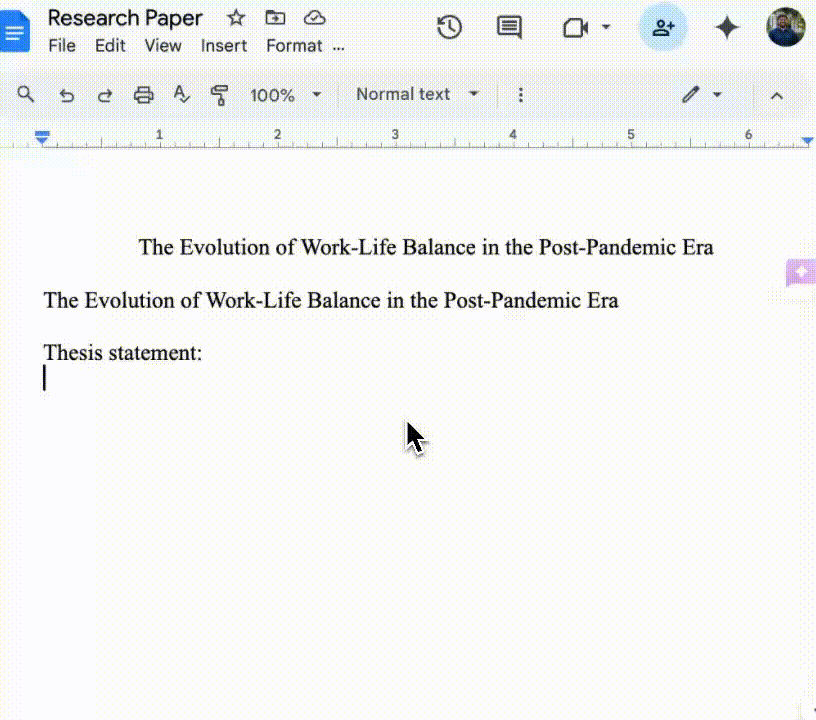How to Restate a Thesis Statement & Write a Good Conclusion in an Essay
Learn how to restate a thesis statement and write a good conclusion paragraph for your essay or research paper.
Knowing how to conclude an essay effectively is just as important as writing a strong introduction.
A great conclusion not only ties everything together but also reinforces your thesis statement, leaving a lasting impression on the reader.
In this article, we'll show you how to restate your thesis statement and write a compelling conclusion paragraph for your essay.
Whether you're writing an informative essay or an argumentative research paper, these tips will help you close your essay with impact and clarity.
Where Do You Restate a Thesis in an Essay?
The thesis statement is typically restated in the conclusion paragraph of an essay or research paper. This placement is strategic—it reminds the reader of the central argument or point of the essay right before they finish reading.
By reiterating the thesis in the conclusion, writers ensure that their key message stays fresh in the reader's mind.
The restated thesis is often one of the first sentences in the conclusion, setting the stage for a summary of the main points. This makes it clear to the reader how the essay has addressed the thesis and supports the writer's argument.
While the conclusion is the primary place for the restated thesis, it's also essential that the language and tone align with the overall message of the essay. It should feel natural and seamlessly fit into the flow of the paragraph.
Why Restate a Thesis in an Essay Conclusion?
Restating the thesis in the conclusion is a critical step to reinforce the main argument and leave a lasting impression. It ensures that the reader understands the essay's central focus and sees how all points tie together.
Restating a thesis in your essay's conclusion:
Reinforces Your Argument - Restating the thesis reminds the reader of the essay's main point.
Emphasizes Importance - It highlights why the argument or analysis matters.
Ensures Consistency - Ties the introduction and conclusion together for a cohesive structure.
Reflects Development - Shows how the argument has evolved through the essay.
By summarizing and rephrasing the thesis, writers strengthen the overall impact of their conclusion. This makes the essay feel complete and polished for the reader.
Use AI Blaze to boost your essay game
How to Write a Conclusion Paragraph in an Essay
A conclusion paragraph is your final opportunity to leave a strong impression on the reader. It should effectively summarize the main points of the essay while reinforcing the thesis.
Essentially, a well-structured conclusion provides a sense of closure and ties all ideas together seamlessly.
Outline for a Conclusion Paragraph:
Transition Sentence
- Begin with a conclusion word like "In conclusion" or "To summarize" to signal the end of the essay.
- Establish a clear connection to the body paragraphs without introducing new information.
Restate the Thesis
- Rephrase the thesis statement in a fresh way to reinforce its importance.
- Reflect on how the essay supports and expands upon the thesis.
Summarize Key Points
- Briefly revisit the main arguments or evidence presented in the body.
- Avoid lengthy explanations—focus on the core takeaways.
Closing Sentence
- End with a final statement that leaves a lasting impression.
- This could be a reflection, a call to action, or a thought-provoking idea related to the topic.
By following this structure, you can craft a conclusion that effectively wraps up your essay and resonates with readers.
How to Start a Conclusion Paragraph
Starting a conclusion paragraph requires a smooth transition from the body of the essay. Begin with a transition word or phrase that signals to the reader that the essay is coming to an end.
The first sentence of the conclusion should reflect the essay's overall theme or tone. Avoid diving straight into new ideas or points that were not discussed in the essay. Instead, focus on summarizing the essay's key message.
A good opening for a conclusion sets the stage for restating the thesis. It should connect back to the introduction, creating a sense of symmetry and closure.
Make sure the opening sentence grabs attention and draws the reader toward the final takeaway. This could be a reflection on the importance of the topic or a broad statement about its implications.
How to Restate a Thesis Statement in a Conclusion Paragraph
Restating a thesis statement is a critical part of writing a strong conclusion. To make the thesis impactful, it should be rephrased thoughtfully and integrated seamlessly into the paragraph.
Here are some tips for how to restate a thesis statement in a conclusion paragraph:
Rephrase Using New Words
When restating your thesis, avoid repeating the exact wording from the introduction. Use synonyms and vary the sentence structure to keep it engaging and fresh.
This shows the reader that you’ve reflected on your thesis and its significance throughout the essay.
Summarize Key Ideas
Focus on the central argument of your essay while keeping the restated thesis concise. Ensure that the restatement connects with the main points discussed in the body.
Highlight the Significance
Emphasize why the thesis matters by explaining its broader implications. This helps the reader see a broad perspective and extent of the point you are making with your thesis statement.
Show the reader how the argument contributes to understanding the topic or solving a problem. This reinforces the importance of your thesis and leaves a lasting impression.
Integrate Smoothly
Ensure the restated thesis flows naturally within the conclusion paragraph. It should transition smoothly into the closing summary or final thoughts.
A cohesive transition from body paragraphs to conclusion strengthens the overall impact of your conclusion. Though, it doesn't have to be fancy. Keep it simple and effective.
Use AI Blaze to boost your essay game
Other Words for 'In Conclusion' + Common Conclusion Words
Using varied transition phrases can make your conclusion more engaging and polished. Instead of always starting with "In conclusion," consider these alternatives:
- To summarize
- Ultimately
- In summary
- All things considered
- To wrap up
- In the final analysis
- As we have seen
- In brief
- To end
- On the whole
- In a nutshell
- To sum it all up
- To bring it all together
Common conclusion words and phrases include:
- Thus
- Therefore
- As a result
- In essence
- In hindsight
- Clearly
- Consequently
- It follows that
- Evidently
- Undoubtedly
- In light of this
Using these alternatives adds variety to your writing and can make your conclusion more impactful and professional.
How to Restate a Thesis: Examples
Restating a thesis is an opportunity to reinforce your essay's main argument in a fresh and engaging way. Tailoring the restated thesis to the essay type ensures that it aligns with the tone and purpose of your writing.
Here are examples for three common essay types:
Argumentative Essay
When restating a thesis in an argumentative essay, focus on reinforcing your position while summarizing the evidence provided. This helps solidify your argument and leaves the reader with a clear understanding of your stance.
Original Thesis: Implementing stricter gun control laws is essential to reduce violence and protect public safety.
Restated Thesis: Stricter regulations on firearms are critical for enhancing public safety and minimizing violence in communities.
Informative Essay
In an informative essay, the restated thesis should emphasize the significance of the topic and recap its key points. This ensures the reader understands the importance of the information shared.
Original Thesis: The Great Wall of China was built to protect against invasions, facilitate trade, and symbolize the power of ancient dynasties.
Restated Thesis: Constructed to safeguard borders, enhance trade, and assert dynastic authority, the Great Wall of China stands as a testament to historical ingenuity.
Analytical Essay
For analytical essays, the restated thesis should reflect on the interpretation provided while linking back to the broader analysis. This reinforces the insights gained through the essay’s exploration of the text or subject.
Original Thesis: Shakespeare's Hamlet explores the complexities of revenge, morality, and human frailty through its protagonist's internal struggles.
Restated Thesis: In Hamlet, Shakespeare delves into the themes of revenge, ethical dilemmas, and human imperfection, illustrated through the protagonist's inner turmoil.
These examples demonstrate how rephrasing your thesis to suit the essay type maintains its impact while adding depth to your conclusion.
Best Thesis Statement Generator

If you are having trouble creating a thesis statement or restating it in your conclusion paragraph, consider giving a thesis statement generator a try.
The best thesis statement generator to help students with their essays is AI Blaze.
AI Blaze is your personal AI studying & writing assistant that helps you quickly generate thesis statements & essays, study guides, take notes, answer questions, solve problems, and much more!
With AI Blaze, you can use AI to write essays, proofread them, and help you streamline the writing process!
Features
Generate thesis statements & essays with AI - Quickly generate thesis statements or any parts of your essay to help you streamline the writing process.
Create practice tests & check your answers - AI Blaze can even help you study by generating practice tests, grading your answers, and providing feedback!
Get help with homework - AI Blaze can answer any homework question and explain it to you to help you learn.
Instantly use GPT-4 on any site with keyboard shortcuts and a dynamic AI sidebar assistant!
AI Blaze is free! - Forget about annoying licenses or subscriptions.
Restate Your Thesis & Write a Good Conclusion in Your Next Essay
Writing a strong conclusion is crucial for leaving a lasting impact on readers. By restating the thesis, summarizing key points, and using engaging language, you can ensure your essay ends on a high note.
Remember, the conclusion is your final opportunity to emphasize your argument and show its significance. Use these tips to craft conclusion paragraphs that are both clear and compelling.
Use AI Blaze if you need help with generating thesis statements using AI for free!




